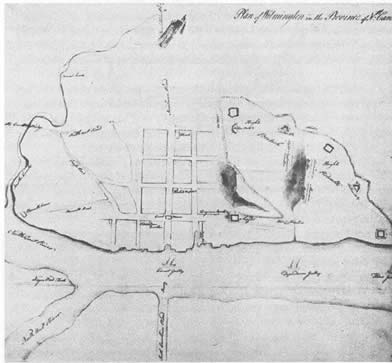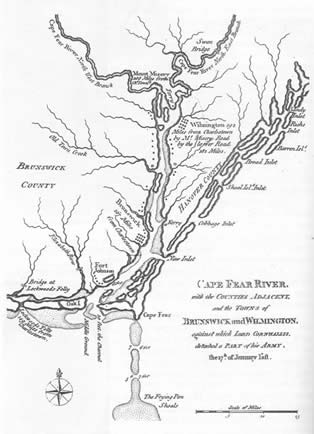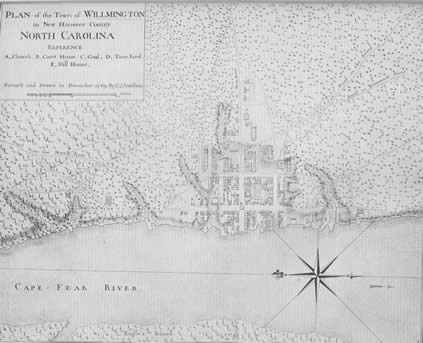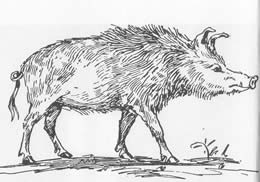
Mission Statement:
"To advance through research, education and symposia, an increased public awareness of the Cape Fear region's unique history."

Colonel Bludworth's Hollow Cape Fear Citadel
Recent photo of "Point Peter" in Wilmington
Cape Fear Historical Institute Papers
The name "Bludworth" (or "Bloodworth") is synonymous with patriot resistance to British occupation and postwar Anti-Federalist feeling in the Cape Fear. The story below is taken from Reverend Eli W. Caruthers
"The Old North State in 1776" originally published in 1854, and the author relates action to harass the British taken by patriot Colonel Thomas Bludworth during Wilmington's occupation by British forces in 1781,
along with his young son Timothy, who would later become a prominent North Carolina Anti-Federalist critic of the 1787 US Constitution.
The recent photograph above was taken from the location of the Coast Guard Cutter "Diligance" dock, near the Market Wharf that Colonel Bludworth targeted with his unique long rifle.
The locale of the story is Negro Head Point, since about 1764 the traditional name of the point where the Northeast and Northwest
branches of the Cape Fear River meet at the northern reaches of downtown Wilmington. The area is also known at Point Peter, perhaps derived from the name of Peter Mallett who owned a plantation at the point. Famed local historian Andrew J. Howell, in referring to the Battle
of Moore's Creek of February 27, 1776 wrote:
"(Loyalist) General MacDonald found himself in command of an
army of 1500 mean, and he prompty prepared to set out with them
to Wilmington. His immediate objective was Negro Head Point,
where the two branches of th Cape Fear unite at Wilmington."
A "Negro Head Road" was said to have stretched from old Cross Creek (Fayetteville) through Sampson County, Near Atkinson in Pender County and crossing the Widow Moore's Creek Bridge, and ending at Negro Head Point at Wilmington.
Colonel Bludworth's Hollow Cape Fear Citadel

Negro Head Point is located in the lower left of this period map
“All who have been at Wilmington, or any where near it, have heard something about Negro-head Point, and about the origin of the name
by which it is so familiarly known. It is the point of land between the
North-East and North-West rivers where they enter the Cape Fear; and
is some four or five hundred yards from Market Street dock. According
to tradition it took the name of Negro-head Point from the fact that, in
the early settlement of the country, the head of a famous Negro outlaw, who had committed sundry acts of theft and murder in this and
adjoining counties, was erected on a stake at this point, and left there
as a warning to others.
At present it is the site of a steam rice-mill, whose spacious front
painted white, and whose tall chimney belching forth dense columns
of smoke, curling and expanding as they rise into the air and floating off
in graceful detachments, present an aspect by no means unpleasant.
The area beyond, containing several hundred acres, is now the rice farm
of Samuel R. Potts, Esq. This locality also became celebrated by
having been the theatre of one of the most remarkable incidents in the revolutionary war.
It was at that time an uncultivated swamp or forest of tall cypress trees, intermingled with an undergrowth of loblolly, bay, rattan and bamboo briars. On the spot where the little office, which is painted white, now stands in front of the main building, once grew a tall cypress, the monarch of the swamp. This tree is said to have been seven feet in diameter, and seventy feet to the first limb. Being hollow throughout it contained within
its base a chamber large enough to accommodate a small family; and
the exterior or shell was perfectly sound, but to this singular mansion
there was no visible entrance.
It was first discovered by Col. Thomas Bludworth, a Welsh gentleman, though now a citizen of the country. When out on a fox chase one morning, the dogs pursued a fox to this point, and then suddenly disappeared.
He could distinctly hear them barking, but could not determine their whereabouts. At length it occurred to him that they must be inside of
the tree; but he could find no hole in it, and no visible entrance. On retracing his steps about fifty yards he perceived that the leaves and
earth had been scratched up as if by dogs’ feet, and a cavern or tunnel
in the earth, large enough he supposed to admit a man, and leading
directly towards the tree.
Entering this subterranean passage and fearlessly pursuing it, he was suddenly ushered into a spacious chamber and found the dogs exulting
over their prey, having killed two foxes, a raccoon and a mink which had entered the hollow of the tree, no doubt as the usual place of their abode.
It immediately occurred to him that this tree might be converted into a citadel for annoying the British who then had possession of Wilmington;
and he returned home revolving this project in his mind, but kept his discovery and his designs a profound secret; for such was the perilous
state of the times that their very inmost thoughts seemed to be conveyed
to the British by the prowling, infamous Tories.
The family of the Bludworth’s came over to this country many
years before the Revolution, and settled near South Washington,
in New Hanover county. They are said to have been patronized
by the celebrated Sir William Jones, who was himself a Welshman,
and one of the most learned men in Europe. The old Colonists
used to exhibit his letters to them with much pride, and expressed
for him the most affectionate regard.
They were poor, but not illiterate.
They were moral and industrious, with strong national feelings, regarding themselves as the pure original Britons, whom the mongrel Anglo-Saxon race had driven from their homes, and despoiled of their property.
Of course they held the English in utter abhorrence, and when the war
of the Revolution broke out, they joined the patriots to a man.
It used to be a common saying among the Whigs that you might as well expect to find “a mare’s nest,” as a Welsh Tory. They furnished many a gallant spirit for the contest; and amid the general excitement and cry for vengeance after the massacre at Rouse’s it was not to be expected that
the Welsh would be idle spectators.
The Bludworth’s all had a mechanical genius, and being like Tubal Cain, very cunning in the working of metals, they manufactured sword-blades, pikes, pistols, and the very best of rifles. When Col. Bludworth
discovered the hollow tree, he thought he could make a rifle which
would carry, with sufficient accuracy, a two ounce ball to the dock
of Market Street. Accordingly he set to work, and made a rifle of uncommon length and caliber. With this he practiced shooting at a
target, the distance which he supposed the tree to be from Market
Dock; and having an accurate eye for mensuration, he was probably
not far wrong.

The experiment succeeded according to his wishes; for having drawn the figure of a man on his barn door, he never failed to lodge a ball in it every shot, but still kept his intentions a profound secret. One fine day in July,
he said to his son Tim, then a small lad, and to Jim Paget, a lath of an
urchin in his employ, “Come boys, let us see if we can't start a fox, or
tree a raccoon, this morning; but as it may be a long hunt, suppose we
take some prog along with us.”
So saying, he filled two wallets with provisions, and laying them on the shoulders of the two boys, he took old Bess, as he called his new made rifle, with an auger and a large jug in his hand to hold water. Thus equipped, they entered a canoe on the North-east River, and set their compass for Negro-head Point. On arriving at the tree, he disclosed the plan to the boys as follows:
“Well, boys, yonder cypress tree is to be our home for two weeks
to come, and mayhap it may be our everlasting home. There is a
large hollow in it, capable of lodging us comfortably, and as it is adapted to my purpose, I want to take possession of it for a time.
It will be necessary to erect a little scaffold, and to make an opening in the tree, fronting Market Dock, where the British are in the habit
of assembling. This opening must be large enough to admit the
muzzle of old Bess; and when she goes off in that direction, with the right charge of powder and lead, somebody’s head may ache; but
not ours: at least the hardest must fend off. Now, if you think you
can stand to it without flinching, say so; if not, say so – and you
can go home, and old Tom will try his luck alone.”
The boys gave three cheers, and said they would stand by him to the last; when they all entered the aperture, one after another, and were soon in
the hollow of the tree. Tim commenced boring a hole, to admit old Bess, standing on the shoulders of his father, and supported by Jim Paget.
A scaffolding was soon erected with pieces of timber, brought in from
the swamp; and additional holes were bored higher up in the tree to
admit light and air. Old Bess was soon in the proper place, and ready
for action. There were, however, several bay trees in front, which completely concealed the lower part of the cypress; but by cutting
away a few limbs and leaves, a full view was given of the British
on Market wharf.
It so happened, that in the summer from ten o’clock in
the morning, until sundown, the wind sets almost uniformly up the river, serving to bear away the smoke of the rifle in a northerly direction among the cypress trees, deadening the report at the same time, and thus concealing it from the enemy.
The morning of the 4th of July, the day of American Independence,
was the time fixed on for old Bess’s introduction to his Majesty’s
loyal subjects.
“You see, boys,” said the Colonel, “that group of
Britishers, with their red coats, standing before Nelson’s liquor
store, on Market wharf? Now, I’ll just dispatch a two-ounce ball,
to inquire what they are doing there this morning; and politely to ask after the health of Major Craig, and that infernal Tory,
Captain Gordon, of the dragoons.”

Crack went the rifle. “See, by the blood!” said Tim, “there is a man down, and four others are lifting him into the shop.” “Very good,” said the Colonel, wiping out the gun, filling his charger with powder, and carefully emptying it into the muzzle, then taking out a patch from the breech,
rubbing it in the tallow box, placing it under the ball at the muzzle,
and carefully ramming it down.
“Fix my seat Tim, and I’ll try if I can send another into the shop to look
for the first.” Another report of the rifle – “There, I’ll be darned to small flinders,” said Jim Paget, “if another ain't down! And see, they are bearing the red-coat into the shop.” Utter consternation seemed to prevail on the wharf: men were running to and fro, some pointing one way, and some another; but no one suspecting the secret source of their annoyance.
The drums began to beat to arms, and the fifes to squeal; but all in vain; they were struck down by an unknown and invisible hand. As if impelled by fate, a column of soldiers now marched down to the wharf, with
colors flying, drums beating, and fifes discoursing most martial music.
“Now Kurnel,” said Jim, “suppose you let me try my hand this time.”
“But Jim,” said the Colonel, “do you think you can hold the gun steady?”
“To be sure I can,” said Jim. “Tis true, my shanks and arms are none of
the biggest; but I think I can do that thing.”
The colonel surrendered to Jim who took steady aim and drew trigger.
In a moment, in the twinkling of an eye, there was universal fluttering in
the dove cote; and the column deployed, scattering in every direction.
Jim, elated with his success, said, “Kurnel, old Bess must have been
rude and offensive to them thar folks. They seem to cut her acquaintance, and are not at all fond of her society; she has
been impudent to them, no doubt; for I have allers hearn that they are a mighty well bred clever folks, and don’t like to have rough-shod rebel missionaries to come preachin’ among’em.”
“But see, Jim,” said the colonel, “they are taking to their boats, and we
may have to leave here in double quick time, but wait and see.”

The boats were rowed across the river to the ferry landing on the
opposite side. Having called a council, and judging that the shot must
have come from the swamp on that side, they divided and began to penetrate the swamp, some on the left and some on the right; but no
boat came in the direction of Negro-head Point, from which they deemed
it impossible that a rifle ball could reach them.
“Now, boys,” said the colonel, “this will do for the first day’s work. Open the provisions; and after having paid our respects to the outer, let us try if we can comfort the inner man.”
On waking next morning, they discovered no one stirring on Market
wharf, and a death-like stillness seemed to pervade the town.
Presently, however, the drum and fife struck up the morning reveille; and the usual hum and bustle were heard in the streets; but still no one approached Market wharf, which had been the theatre for the display
of Bess’s prowess on the day before.
“What, ye have got shy, have ye?” said Jim. “Wait till grog time,
which, with these Britishers, is allers about ten o’clock, for they
say the sun rises an hour too late in this country, and if you don’t
see Nelson’s liquor shop crowded with red coats, then I’m a liar.
We need be in no hurry; for the wind wont fairly set up the
river before that time.”
Sure enough, Jim proved no false prophet in Israel; for just as the hour arrived, several red coats were seen gliding rapidly into the shop as if fearful they would be shot down in their transit. Towards twelve o’clock, meeting with no molestation, they became more confident, and assembled as usual in groups before the door.
“Now Kurnel,” said Jim, “suppose you introduce Bess among them agin;” and no sooner said than done. Crack went the rifle, and another prostrate Briton was carried into the shop.
The gun having been reloaded, as a dragoon rode down to the dock
to water his horse, “There Kurnel,” continued Jim, “that’s a mighty purty feather in that feller’s cap. I think a little wetting would improve it; try
and dip it into the river.” Another blast of the rifle, and the dragoon and
the plume lay in the water. The man was hurriedly borne up the street,
the drums beat to arms again, and boatmen were sent out to scour the swamp on the opposite side; but returned with the same result as before.
Our adventurers had been amusing themselves with this pastime for
a week or more when a prowling Tory informed the British that old
Tom Bludworth had been for some time from home; that he had
taken with him a large rifle of his own manufacture, and that, as
he must be concealed somewhere in the swamps, he was probably
the author of this mischief.
The sagacious Tory also thought it possible, though not very probable,
that Negro-head Point was the place of his concealment, and advised
them to give it a thorough search, to cut down all the under growth
and some of the cypress trees, so as to afford no hiding place for the
d – d rebels.

One morning early the Colonel said to his son: “Tim, are not those boats coming toward this place?” “I think they may be, father; shall we retreat or await the result?” “Why,” said Jim Paget, “if Tim will only shut up that
thar hole where old Bess peeps out when she wants to pry into other people’s biziness, I think we might as well stay here; for it will take
good eyes to look into this here holler.”
Jim’s advice was taken, and the hole was ingeniously closed up.
In the mean time the boats approached, and having landed twenty men
at the Point, they proceeded instantly with their axes to cut away the
under-growth and some of the cypress trees; but it was late in the
evening before they got to the cypress where our heroes lay concealed.
“Well,” said a soldier as he struck an axe into it,, “as it is now sun-down, suppose we let this huge fellow stand until morning; but it must be cut down, for it is so large that it obstructs the view into the swamp beyond.”
“It will be a herculean labor,” said an officer, not suspecting that it was hollow, “and it is too late to undertake it now; but let ten axes encounter
it at sun-rise to-morrow morning.”
The inmates of the tree, who had thought that their last hour was approaching, now began to breathe more freely; and, not doubting that
they could make their escape in the course of the night, they began to feel that they had a prospect of more days to live. The officer called off the
men – all except the ten who were to be employed the next morning in
the charitable work of removing the tree – and returned to town.
The ten men who were left retired to a large yawl floating at the point, spread over it an awning, and unceremoniously went to sleep, leaving
three sentinels posted, one at the yawl, one a few hundred yards up the North-West, and another about the same distance up the North-East
river, near the pace of the old ferry landing. There was a small recess in
the river, concealed by rushes where our adventurers had left the canoe which brought them down, and was to serve them again in time of need.
Unfortunately, as it seemed to them, this recess was only a few feet
from one of the sentinels, and to reach it unobserved they thought
was impossible. The first thing that occurred to them was to creep up
and tomahawk him at his post; but, much to their gratification, they
were relieved from this bloody alternative.
Jim had left the tree unobserved by the others, and he had gone forward
for the purpose of reconnoitering, but, as bad luck would have it, when
he approached within ten steps of the North-East sentinel, cautiously and silently opening the rushes as he advanced, a rotten rattan snapped short
in his hand as he was endeavoring to thrust it aside and seemed to
expose him to imminent danger of being shot.
“Who goes there?” cried the sentinel, and at the same time presenting
his piece in the direction of the sound; but Jim, who had got his diploma
for imitating the voices of sundry animals, wild and tame, only answered with a grunt, which was the perfect imitation of a piney-woods hog.

“O, blast your long snout,” said the sentinel, “I might have known it was you, for who the devil would be fool enough to be eat up by the
musquitoes in the swamp at this time of night? There will be little use
for you to-night,” said he, addressing his gun, and resting it upon a stump, and then, leaning himself against a tree, in a few minutes, he began to
snore with his mouth wide open, as Jim could plainly see by the
light of the moon.
Hastening back to his companions, he said to them, “Come quickly!
The cussed critter is fast asleep, with his mouth wide open’ but tis a pity
to kill him; so we’ll just thrust a gag in his mouth to keep him from hollering; and if he does holler, I’ll tell him this hatchet shall taste his
skull, and I’ll swagger but he’ll keep quiet.”
Then cutting a round stick, and tying a string to each extremity, he
went up to the guard and instantly thrust the stick between his jaws,
tying the string behind his neck, and leaving him, bound hand and foot
in the swamp.
These gallant adventurers now returned home in safety and
without molestation; but the Englishmen, on finding the sentinel next
morning at his post bound hand and foot, and on attacking the big
cypress, according to orders, soon had the secret of their annoyance brought to light, and though much mortified, they were saved any further trouble in that direction. They soon afterward evacuated the town…and went where they had perhaps more important work to do, but not
more glory in the result.”
Source:
(The Old North State in 1776, Volume II, Rev. Eli W. Caruthers,
Hayes & Zell, 1856, pp. 197-200)
©2006 Cape Fear Historical Institute